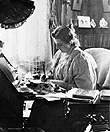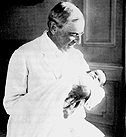 In spite of all the
aids, comforts, and privileges that come to a President and his family, homemaking
in a house that is also a national monument has its drawbacks. When President Coolidge arrived at
the White House in 1923, he tried to continue his pleasant after-dinner habit
of sitting on his front porch--the great North Portico--and watching the people
go by on Pennsylvania Avenue. So many pedestrians stopped to stare at him, however,
that he gave up his modest form of relaxation. President Coolidge, too, once invited
a Missouri Senator friend to accompany him on an evening walk outside the grounds.
As they returned to the mansion, the Senator remarked facetiously, "I wonder who
lives there." "Nobody," replied the President. "They just come and go." In spite of all the
aids, comforts, and privileges that come to a President and his family, homemaking
in a house that is also a national monument has its drawbacks. When President Coolidge arrived at
the White House in 1923, he tried to continue his pleasant after-dinner habit
of sitting on his front porch--the great North Portico--and watching the people
go by on Pennsylvania Avenue. So many pedestrians stopped to stare at him, however,
that he gave up his modest form of relaxation. President Coolidge, too, once invited
a Missouri Senator friend to accompany him on an evening walk outside the grounds.
As they returned to the mansion, the Senator remarked facetiously, "I wonder who
lives there." "Nobody," replied the President. "They just come and go."
Though Chief Executives have moved in and out with regularity,
the White House has always been a place of extremely personal living. Indeed,
the attention commanded by the Presidency intensifies and exaggerates the normal
joys and sorrows of everyday family experience, the high moments of birth and
death that are part of life here as in any other home. One of the most endearing
aspects of life at the Executive Mansion can be glimpsed from the hundreds of
stories that have come down through the years about the many children who have
lived there.
The very young ones were usually grandchildren, since few men
have reached the top rung of the political ladder in their early years. And
the first of all children whose shouts and laughter echoed through the mansion
was 4-year-old granddaughter of John and Abigail Adams. Jefferson's
eight years in the presidency were cheered and brightened by the many visits
of his married daughters, Martha Randolph and Maria Eppes. On one of the visits,
in the winter of 1805, Mrs. Randolph gave birth to her eighth child--James Madison
Randolph--the first baby born in the Executive Mansion. 
The most photographed Presidential grandchild of the 19th century
must have been "Baby McKee," who lived in the White House with grandfather Benjamin
Harrison and his four-generation family during the early 1890's. Little
Benjamin was often photographed as he drove his own goat cart about the grounds.
The goat once ran away with Baby McKee. As the goat darted off with the boy
and raced down the White House driveway onto Pennsylvania Avenue, the portly
President himself, dressed in top hat and frock coat, followed in hot pursuit.
President Lincoln
and Mary Lincoln were loving and
indulgent parents who often said, "Let the children have a good time." This
the children did, and the President's friends and colleagues quite probably
felt at times he was too permissive when he failed to punish Tad for bombarding
the door with his toy cannon during a Cabinet meeting, or when the boy stopped
his father's callers to sell refreshments and wheedle money for war charities
at stands he set up at the mansion.
|

